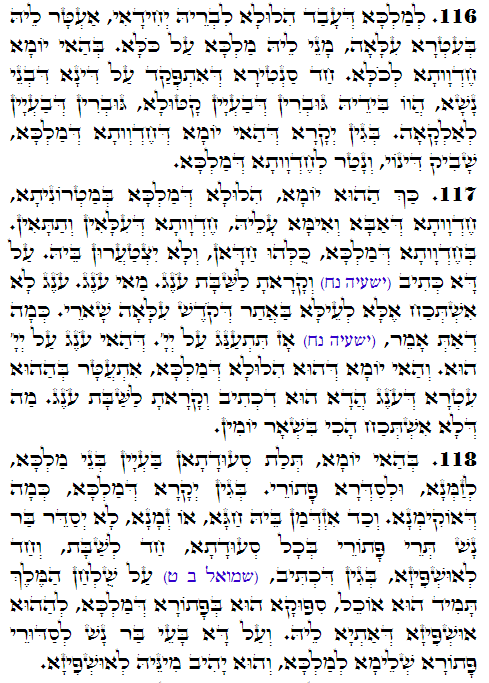Daily Zohar # 3347 – Emor – Call the Shabbat delight
Hebrew translation:
117. כָּךְ אוֹתוֹ הַיּוֹם, הִלּוּלַת הַמֶּלֶךְ עִם הַגְּבִירָה, שִׂמְחַת הָאָב וְהָאֵם עָלָיו, שִׂמְחַת הָעֶלְיוֹנִים וְהַתַּחְתּוֹנִים. בְּשִׂמְחַת הַמֶּלֶךְ כֻּלָּם שְׂמֵחִים, וְלֹא יִצְטַעֲרוּ בוֹ. עַל זֶה כָּתוּב (ישעיה נח) וְקָרָאתָ לַשַּׁבָּת עֹנֶג. מַה זֶּה עֹנֶג? עֹנֶג לֹא נִמְצָא אֶלָּא בְּמָקוֹם שֶׁשּׁוֹרֶה הַקֹּדֶשׁ הָעֶלְיוֹן, כְּמוֹ שֶׁנֶּאֱמַר אָז תִּתְעַנַּג עַל ה’. שֶׁהֲרֵי עֹנֶג הוּא עַל ה’. וְהַיּוֹם הַזֶּה שֶׁהוּא הִלּוּלַת הַמֶּלֶךְ, מִתְעַטֵּר בְּאוֹתָהּ עֲטָרָה שֶׁל עֹנֶג. זֶהוּ שֶׁכָּתוּב וְקָרָאתָ לַשַּׁבָּת עֹנֶג, מַה שֶּׁאֵין נִמְצָא כֵּן בִּשְׁאָר הַיָּמִים.
118. בַּיּוֹם הַזֶּה שָׁלֹשׁ סְעוּדוֹת צְרִיכִים בְּנֵי הַמֶּלֶךְ לְזַמֵּן וְלַעֲרֹךְ שֻׁלְחָנוֹת בִּשְׁבִיל כְּבוֹד הַמֶּלֶךְ, כְּמוֹ שֶׁבֵּאַרְנוּ. וּכְשֶׁמִּזְדַּמֵּן בּוֹ חַג אוֹ זְמַן, לֹא יְסַדֵּר אָדָם שְׁנֵי שֻׁלְחָנוֹת בְּכָל סְעוּדָה, אֶחָד לְשַׁבָּת וְאֶחָד לָאוֹרֵחַ, מִשּׁוּם שֶׁכָּתוּב (שמואל-ב ט) עַל שֻׁלְחַן הַמֶּלֶךְ תָּמִיד הוּא אֹכֵל, הַהֲנָאָה הִיא בְּשֻׁלְחַן הַמֶּלֶךְ לְאוֹתוֹ הָאוֹרֵחַ שֶׁבָּא אֵלָיו. וְעַל כֵּן צָרִיךְ אָדָם לַעֲרֹךְ שֻׁלְחָן שָׁלֵם לַמֶּלֶךְ, וְהוּא נוֹתֵן מִמֶּנּוּ לָאוֹרֵחַ.
.
Zohar Emor
#116
During Shabbat, the forces of judgments are at rest. It’s like a King that makes a special celebration for his son. He gives him a supernal crown and appoints him on everything in the kingdom.
Because of the joy and honor of the king on that special day, the forces that execute judgments on people suspend their activities to avoid pain and sadness from all.
#117
Isaiah 58:13,14 “ אִם תָּשִׁיב מִשַּׁבָּת רַגְלֶךָ עֲשׂוֹת חֲפָצֶיךָ בְּיוֹם קָדְשִׁי וְקָרָאתָ לַשַּׁבָּת עֹנֶג לִקְדוֹשׁ יְהוָה מְכֻבָּד וְכִבַּדְתּוֹ מֵעֲשׂוֹת דְּרָכֶיךָ מִמְּצוֹא חֶפְצְךָ וְדַבֵּר דָּבָר.” “אָז תִּתְעַנַּג עַל יְהוָה וְהִרְכַּבְתִּיךָ עַל בָּמֳתֵי אָרֶץ וְהַאֲכַלְתִּיךָ נַחֲלַת יַעֲקֹב אָבִיךָ כִּי פִּי יְהוָה דִּבֵּר.” “If you turn away your foot from the Sabbath, From doing your pleasure on My holy day, And call the Sabbath a delight, The holy day of YHVH honorable, And shall honor Him, not doing your own ways, Nor finding your own pleasure, Nor speaking your own words,”
“Then you shall delight yourself in YHVH; I will cause you to ride on the high hills of the earth, And feed you with the heritage of Jacob your father. The mouth of YHVH has spoken.”
On Shabbat, Zeir Anpin and Malchut join the King and Queen that are Father and Mother. They have a feast that brings joy to the upper and lower worlds. For that reason, Shabbat is called ‘ענג’ ‘delight’. This pleasure comes only from the supernal Father and Mother, a connection that can happen on Shabbat and not on weekdays.
#118
On Shabbat, we prepare three meals for the King’s honor. The holidays as we explained previously are considered as guests and they share the same table with the King. Because of that, we set up the meal table with everything for the King that brings nourishments to his children and guests.
Lesson;
The weekdays are not holy. Having pleasures during this time is unholy and connects to the desire for the self that can bring a negative outcome. On Shabbat, we receive true and free pleasures from the Holy Father and Mother.
The pleasures on Shabbat that we establish with our prayers and three meals, activate the promise of YHVH that we read in Isaiah 58:14 “אָז תִּתְעַנַּג עַל יְהוָה וְהִרְכַּבְתִּיךָ עַל בָּמֳתֵי אָרֶץ וְהַאֲכַלְתִּיךָ נַחֲלַת יַעֲקֹב אָבִיךָ כִּי פִּי יְהוָה דִּבֵּר.”
“Then you shall delight yourself in YHVH, And I will cause you to ride on the high hills of the earth, And feed you with the heritage of Jacob your father. The mouth of YHVH has spoken.”
Righteous people eliminate all types of pleasure during weekdays. They enjoy the Shabbat and the meals that provide spiritual and physical nourishment.
The Sages teach us to make blessings on everything we do, consume, smell, and even make a blessing when we see a man that we appreciate his wisdom. The blessings connect us to the energy source of God and not to the simple material level.
The above verse is part of the fourth meal process that we do immediately after Shabbat. It supports the manifestation of the Light of Shabbat to the weekdays ahead.
{||}

 Previous: Emor
Previous: Emor


